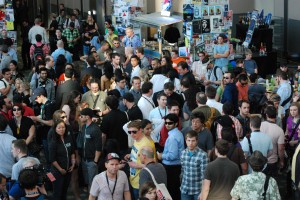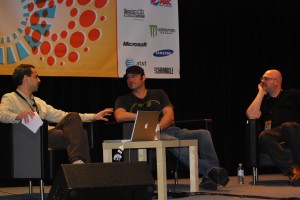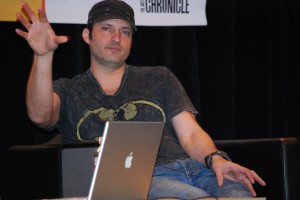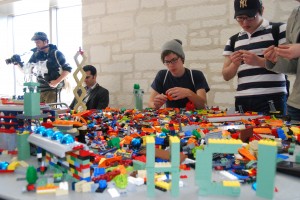Panels! First The Politics of HTML 5. Unfortunately I only saw about half of this panel. The panelists discussed the problems of setting the specs for the HTML 5 standard and navigating the interests of stakeholders who sometimes have opposing objectives- the “priorities of the various constituents†are not the same. John Foliot of Stanford pointed out that a large percentage of the open bugs and issues in the standard currently have to do with accessibility. “There is tension between what a working group can do and a federal agency can do.â€

Urban Technology on the Dark Side looked at the relationship of cities to technology, focusing partially on military and governmental surveillance. It also showed how activists, artists and architects have subverted techniques of surveillance and partition to their own ends. Artist and geographer Trevor Paglen’s long-range photographs and Project Cybersyn, a project in real-time computing used as an economic model during the Salvador Allende government in Chile were shown.
At Big in Japan: Outreaching to a Unique Market, panelists discussed specific cases that succeeded in establishing brands in the Japanese market. Blogger Fumi Yamazaki explained how different generations use mobile devices, and pointed out that the commute of the average Japanese worker is about twice as long as an American’s and it is spent on a train (not driving) where they can use their devices. Ryan Holmes of Hoot Suite commented that some of their success in Japan might be due to the cute mascot they had made into a stuffed animal. Information was shared about contributing to the relief effort in Japan.

Founder of 4chan Christopher Poole discussed the importance of allowing users to remain anonymous in a site with user-generated content such as his image-based bulletin board. “The cost of failure is really high when you are using your real name.†His site favors “content over creator, creators squeezed together riffing back and forth. In 4chan, its not just the product but the process as well.â€Â In 4chan, none of the content is archived, it is dynamic and ephemeral. Poole also demoed Canvas, his new project which launched in beta earlier this year. Again it is user-generated, set up in a collaborative model, at this point all content is visual. This time users must set up an account, for now through Facebook, though they may remain anonymous. It offers users simple tools “to level the playing field†to create and share images.

Of Fanboys & Fidelity – Adapting Comics For Broad Audiences: Filmmaker Robert Rodriguez, (who as an undergraduate at U T was a cartoonist and had a strip in the student newspaper), had long been a fan of Frank Miller’s series Sin City when he approached him about making the series into a film. He got Miller interested in working with him by shooting some scenes based on the graphic novel and flying to NY to show him. Miller was concerned about the script, so Rodriguez wrote it in a month based on the graphic novels (there is no screenplay credit in the movie, Rodriguez considers it an adaptation). “I made it very easy for himâ€.

Greg Rucka, writer of the graphic novel Whiteout, discussed his experience in seeing his work turn into a movie. He did not write the script, he wrote 3 scenes based on character, not plot. Rucka expressed strong opinions on how the super hero genre is seen by Hollywood producers-“Fidelity to the character makes or breaks these movies. Big studios approach to super heroes is apologistâ€.
That’s it from me about panels for this year. Other SXSW news- this is the year of the group messaging app. GroupMe, Beluga and many more. The parties were a lot of fun, Lone Star beer everywhere, along with a big pile of carrot sticks.

